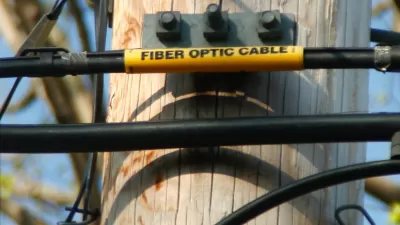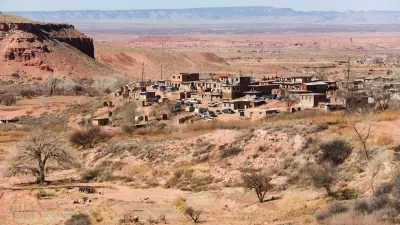Broad thinking about the future may mean focusing on smaller, technology-based planning solutions, according to this essay from Regional Plan Association Executive Director Thomas K. Wright.
Wright says the RPA has historically focused much of its planning on hard infrastructure like transit. The future, he says, is likely softer and smaller.
"But in our current century, there is the potential for silicon chips, the Internet, and new wireless technologies to make potentially much smaller interventions in the physical environment very important. Mario Gandelsonas, Director of Princeton University's Center for Architecture, Urbanism and Infrastructure, calls these systems 'soft infrastructure.' And as we start to think about what kind of recommendations may be included in RPA's Fourth Regional Plan, we are going to be paying close attention to these opportunities. Call it 'The Smart Region Plan.'"
FULL STORY: From Bricks to Bytes, Cities and Innovation

Americans May Be Stuck — But Why?
Americans are moving a lot less than they once did, and that is a problem. While Yoni Applebaum, in his highly-publicized article Stuck, gets the reasons badly wrong, it's still important to ask: why are we moving so much less than before?

Study: Maui’s Plan to Convert Vacation Rentals to Long-Term Housing Could Cause Nearly $1 Billion Economic Loss
The plan would reduce visitor accommodation by 25,% resulting in 1,900 jobs lost.

Placekeeping: Setting a New Precedent for City Planners
How a preservation-based approach to redevelopment and urban design can prevent displacement and honor legacy communities.

San Diego Swaps Parking Lane for Kid-Friendly Mini Park
The block-long greenway will feature interactive play equipment and landscaping.

Tracking the Invisible: Methane Leaks From LA’s Neighborhood Oil Sites
Environmental advocates are using infrared technology to monitor and document methane leaks from neighborhood oil sites, filling regulatory gaps and pushing for stronger protections to safeguard community health and the climate.

Montana Bill Promotes Parking Reform
A bill before the Montana state senate would bar cities from requiring more than one parking spot per new housing unit.
Urban Design for Planners 1: Software Tools
This six-course series explores essential urban design concepts using open source software and equips planners with the tools they need to participate fully in the urban design process.
Planning for Universal Design
Learn the tools for implementing Universal Design in planning regulations.
Caltrans
Heyer Gruel & Associates PA
Institute for Housing and Urban Development Studies (IHS)
City of Grandview
Harvard GSD Executive Education
Salt Lake City
NYU Wagner Graduate School of Public Service
City of Cambridge, Maryland





























